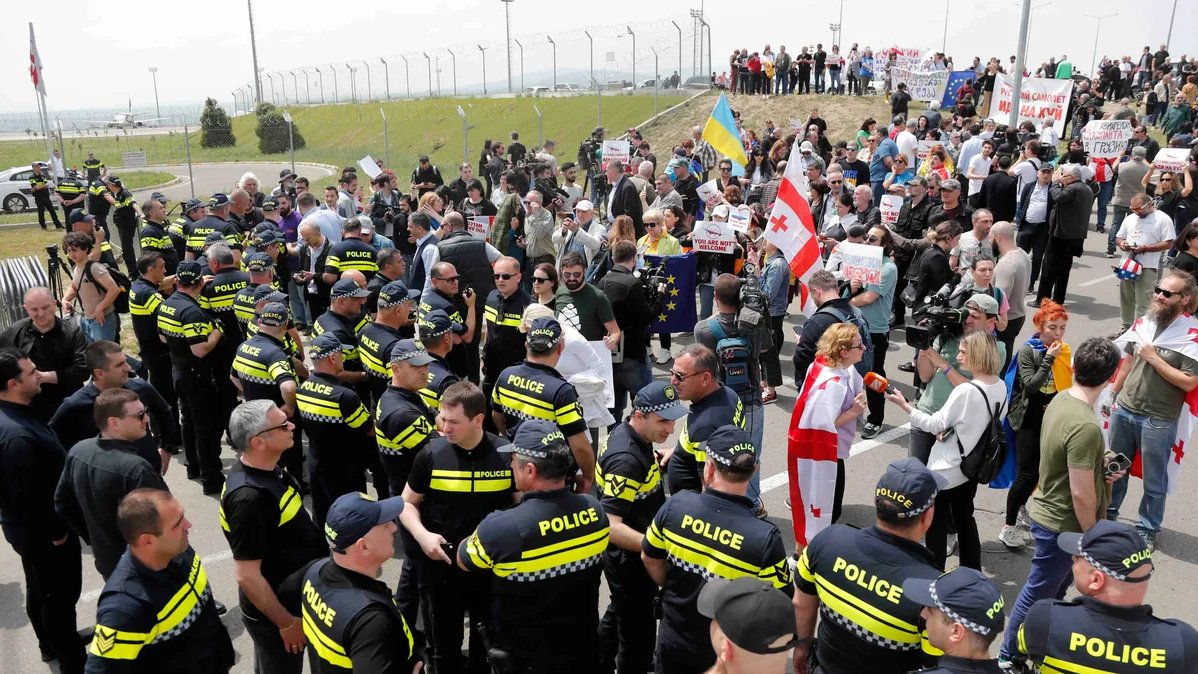On 19 May 2023, the first direct flight from Moscow in four years landed in Georgia’s capital Tbilisi. The ban on air traffic was introduced by Vladimir Putin’s decree in July 2019 in response to anti-Russian protests in Tbilisi. Now that the war is on, the ban has been lifted, which caused objections in the EU, US, and partly in Georgia itself.
Moscow’s Vnukovo Airport is unusually deserted for a Friday morning. I’ve checked in online, so I’m heading straight to the customs. A sleepy customs officer asks me politely: “What is your destination?” He scowls as I say “Tbilisi”, looks me right in the eye and snarls out in a soldierly manner: “How much cash do you have on you?!” This question is due to one of the wartime restrictions: after the EU and the US banned bringing euros and dollars in cash to Russia, Moscow strictly controls the outflow of foreign bills. One cannot have over 10 thousand dollars in cash while leaving Russia.
The next step is border inspection. A staff member with his head shaved carefully examines every facial feature of mine. As he puts my credentials into the database and makes sure I have a return ticket booked, he says casually: “You’re free to go”. The gate remains motionless, though.
“You need to push it!” says the officer.
It looks like there are more reporters than passengers near Gate 28, preparing for Flight А4851 from Moscow to Tbilisi. All the state media outlets are represented here: Rossiya-1 TV channel, Rossiyskaya Gazeta, Moscow 24, Zvezda, and RIA Novosti.
There is also an RBC reporter and several bloggers. Unwilling to join them, I start walking around the airport. In a deserted foreign flights terminal, rows of empty chairs bring out images from the past. Some still have red crosses on them, recommending to maintain social distancing. One of the TV screens displays a contract service ad with a photo of a young serviceman. “Come and join our ladZ,” it reads. On a neighbouring screen are departures — to “friendly countries” only, such as Central Asian states, Turkey, or Iran. And Georgia: for the first time since July 2019.
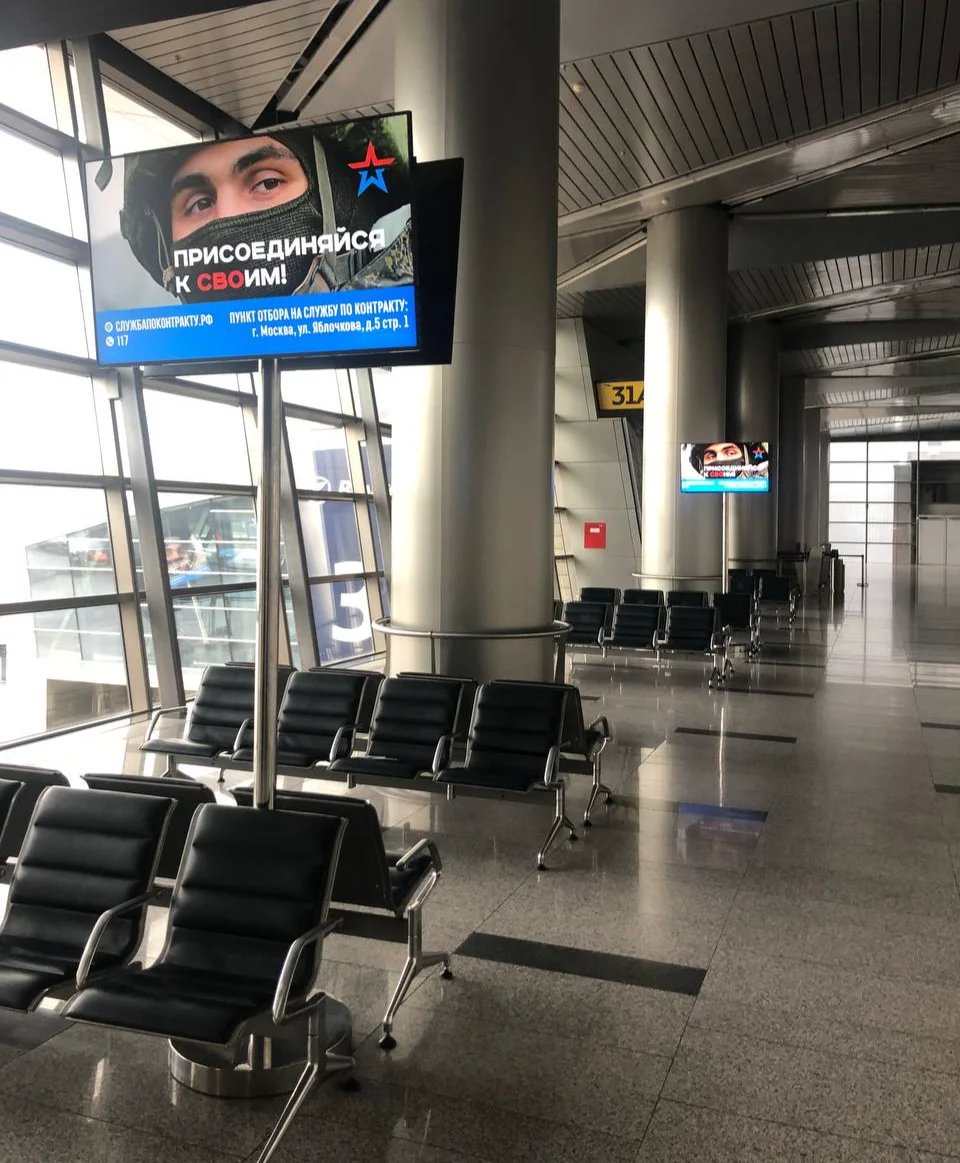
The “Come and join our ladZ” banner in Moscow’s Vnukovo Airport. Photo: Fyodor Yershov, exclusively for Novaya Gazeta Europe
Interrupted flights
Air and land connection between Russia and Georgia has been interrupted on at least five occasions since 1993. First, the border was closed due to the “spy scandal” in the autumn of 2006, when four Russian GRU officers had been arrested in Tbilisi and Batumi. The negotiations that lasted several days led to their release and return to Moscow. In response, Russian authorities closed all transport links to Georgia and issued a ban on Georgian goods, including wine and Borjomi mineral water.
Flights between the two countries were restored for a short period in March 2008 before they were cancelled again in August due to the Russo-Georgian War — Russia’s invasion into Georgia in support of the self-proclaimed South Ossetia and Abkhazia. In 2010, charter flights resumed, and regular flights made a comeback in 2014.
In June 2019, Vladimir Putin signed a decree that prohibited Russian air companies from operating flights to Georgia until further notice. Package tour operators were “discouraged” from selling offers to the country.
That time, the reason behind the ban was a scandal caused by a visit Sergey Gavrilov, Russian MP from the Communist Party, paid to Georgia. He arrived in Tbilisi for an annual Interparliamentary Assembly on Orthodoxy that unites Orthodox politicians from 21 countries. The event was held inside the Georgian parliament. Gavrilov, who was the president of the Assembly, sat in the chair of the parliament’s speaker, which caused public outrage. During a break, MPs from the Georgian opposition blocked the stand and prevented the Russian delegation from coming back into the parliament’s chamber. Soon enough, protesters arrived, and clashes with police began.
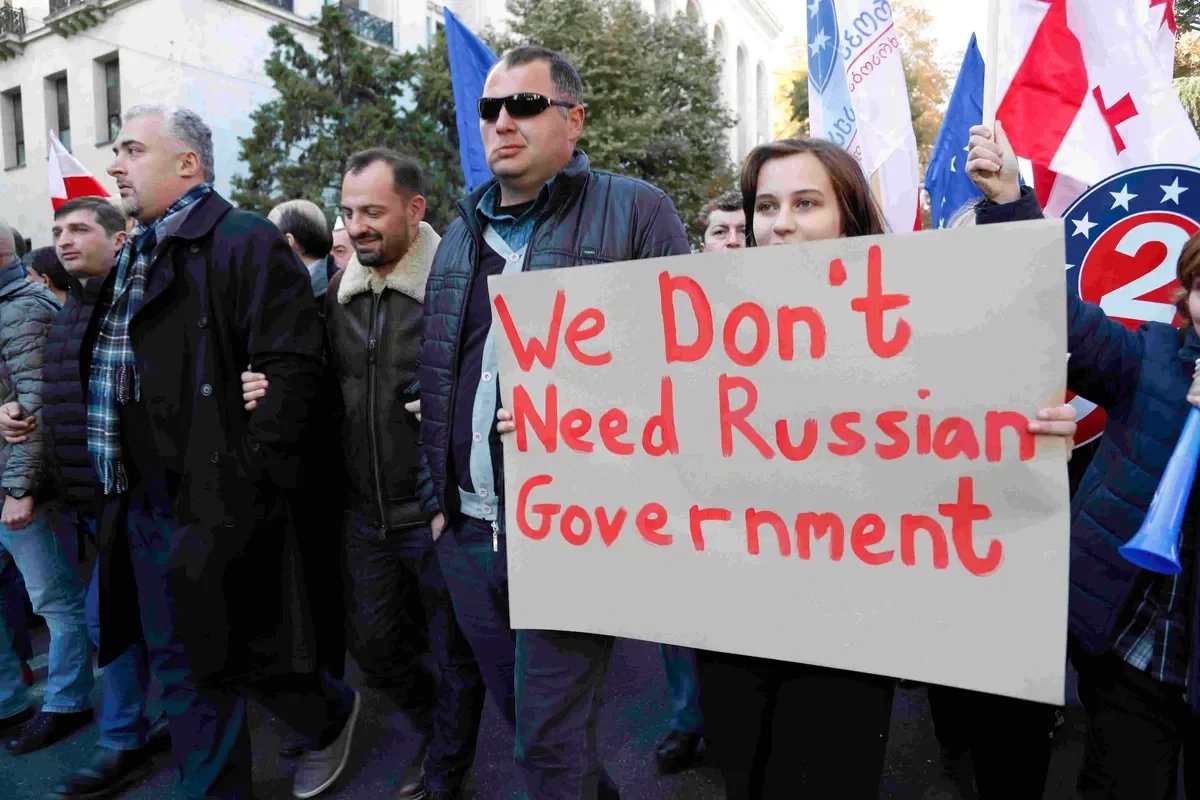
A protester holding a poster reading “We Don’t Need Russian Government”, Tbilisi, 2019. Photo: EPA-EFE / ZURAB KURTSIKIDZE
The protests that were later coined as “Gavrilov’s Night” forced Irakly Kobakhidze, the speaker of the Georgian parliament, to resign and lasted until mid-July. Nino Burdzhanadze, the former speaker of the parliament, stated as she spoke to Russia’s Kommersant FM: “This was blatant incompetence from the Georgian authorities because you could expect people to have some kind of emotional outburst when a Russian MP is sat in the speaker’s chair in the parliament. This chair is a sort of a symbol of Georgia’s independence and sovereignty”.
The Russian authorities suggested that direct flights from and to Georgia be restored in January 2023. During a press conference, Russian Foreign Minister Sergey Lavrov stated: “I am glad that contacts between people are actively developing in our countries. Last year, I was told, Georgia’s GDP grew by 10%, largely due to tourism and trade relations with the Russian Federation. I hope that we will be able to resume direct flights soon.” The ban was formally lifted by Putin’s decree on 10 May 2023.
The leaders of the Georgian Dream ruling party welcomed the decision. The party’s chairman Irakly Kobakhidze explained: “Our stance is very simple; up to a million of Georgian nationals and ethnic Georgians live in Russia, and they need to travel via some third countries in order to come to Georgia. This causes additional expenses and discomfort, and so on. In reality, Russia punished those people in 2019, and now we have seen this sanction lifted.”
Khatia Dekanoidze, Georgian opposition MP, stressed in her comment for Novaya-Europe that the eagerness to restore air traffic is another sign that the policy of the current Georgian authorities is anti-Western and anti-Ukrainian. “Putin’s decisions are a reward for the policies conducted by Georgia’s authorities in the last months, especially after the start of the full-scale Russian aggression in Ukraine,” she said. Khatuna Lagazidze, a political scientist, says that Putin’s decision demonstrates that he is trying to get a foothold in another post-Soviet country as he is suffering a defeat in Ukraine: “Many talk about Putin allegedly awarding Georgia’s government. But I think that his main motivation is sending out a message to his own people: he might not win the war in Ukraine, he might be losing positions in Armenia and Azerbaijan, but at least his presence is big in Georgia.”
The first passengers
Among the passengers of the first flight are nationals of both countries. Rashad from Tbilisi says that before the flights were restored, he had to take a bus through Vladikavkaz and spend two days on the road. “I am a Russian national, but my home country is Georgia,” he says. “Now I will be visiting it more often”.
Eduard from Moscow has a sad reason to travel to Georgia: “I am going there because a good friend of mine, my former classmate, has died. His name was Archil. If I took an indirect flight, I would have only made it soon enough for the funeral feast. That’s pointless, I might as well drink to his memory at home, or go to a local church to put a candle in his honour.” Eduard supports Kobakhidze’s opinion that hundreds of thousands of Georgians work in Russia and send money home.
Another passenger is Merab Chikashvili, the chairman of the pro-Russian Solidarity in the Name of Peace community organisation in Georgia. On 9 December 2022, he and other pro-Kremlin activists took part in a forum in Moscow called “Russo—Georgian relations: development prospects”. The forum was attended by Russian MPs and employees of the Foreign Ministry and Transport Ministry. “This was a difficult path, but our suggestions were forwarded to Vladimir Putin and Sergey Lavrov,” Chikashvili says. The next day Russia’s Foreign Ministry hinted that flights to and from Georgia could potentially be restored.
Chikashvili says the decision was finally made in March 2023. The pro-Kremlin politician is proud of this: “Our grassroots diplomacy did its job. I thank not only the authorities of Georgia and Russia for this, but also the people of Russia, Russian citizens.
We need to improve our relationship. It is especially important to be good neighbours now that the world is on the verge of WW3.
Only a minority of Georgians dislike this decision. They want to distort history, to disregard centuries of friendship. Do a survey, ask Georgian nationals. They will tell you everything frankly.”
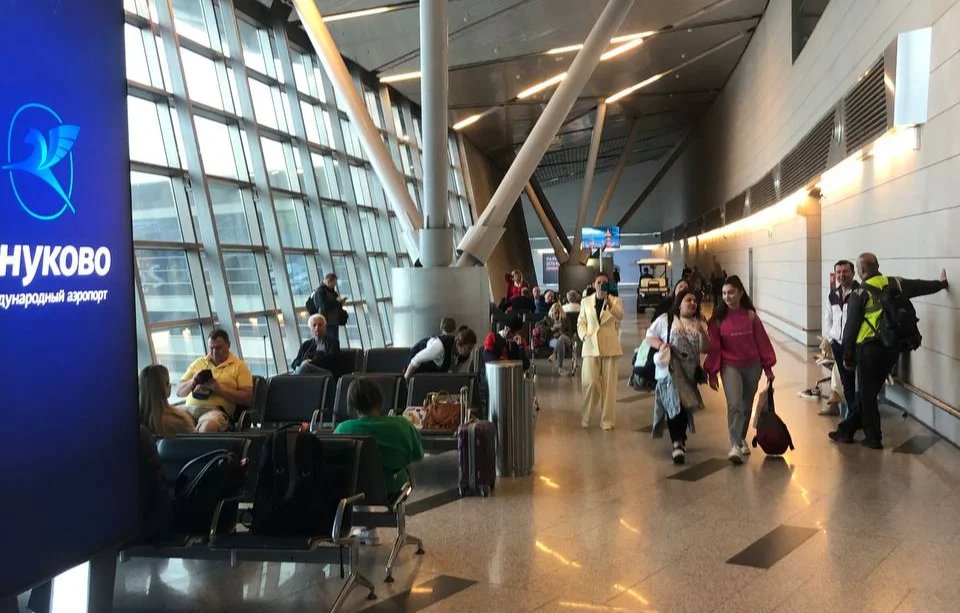
Vnukovo Airport. Photo: Fyodor Yershov, exclusively for Novaya Gazeta Europe
Other passengers of the А4851 flight are not eager to discuss politics. Sofia Moshe, a blogger, says: “I’m totally over the moon that direct flights have been restored as it saves a lot of time.” Tazu, a man sitting next to me, is no chatterbox: “I’m going there to meet my family. A man like me has never been deep into politics. Let them say whatever they want, the most important thing is that there are direct flights now.” Natalya, a businesswoman, is going to Georgia with her colleagues “to try out khinkali [Georgian dumplings] and chacha [Georgian brandy]”. “I’m not good at politics, I cannot assume anything. I’m for world peace, friendship between peoples, good times, and open borders.”
It’s about time we board the plane. A RIA Novosti reporter is trying to ask a random passenger a few questions: “Why are you happy that there are now direct flights to Georgia?”
The frightened Azerbaijani man is running past the on-coming crowd with cameras and voice recorders, waving reporters off with his passport and shouting: “I’m going to Baku!”
Alexander Buzaladze from Rossiya-1 TV is also present here. In December 2022, he recorded a fake interview with Russians in Georgia, posing as a Georgian reporter. He lifted words out of the context and published a story titled “Depressed Russian fugitives wander around Georgia with nothing to do”.
Reporters, bloggers, and propagandists get onboard the plane. The Azimuth air company chose a Sukhoi SuperJet 100 (SSJ 100) for the А4851 flight. After the Ukraine war had started, Russia de facto seized Boeing and Airbus planes from foreign leasing companies, so those may be arrested should they leave Russia. Now Russian air companies are trying to use Russian-made planes for international flights. The most popular model is SSJ 100; such planes have already suffered several crashes. For instance, in May 2019 an SSJ 100 hit the ground three times and caught fire while landing in Moscow’s Sheremetyevo Airport.
The flight is going as normal. Nobody is listening to the safety instructions: some fall asleep, and others start writing their media reports or filming for a vlog. The flight attendants politely refuse to share any comments as their airline’s press service does not allow them, but they say they’re pretty happy. Tо commemorate the resumption of flights, the attendants are offering Lambrusco sparkling wine and keychains with the airplane logo to the passengers. Natalya and her colleagues seem overwhelmed with the media attention and limitless beverages. They profess their love for Georgian wines, cuisine, and men, and as we approach landing, they shout: “Georgia, we’re coming!” and clap their hands loudly.
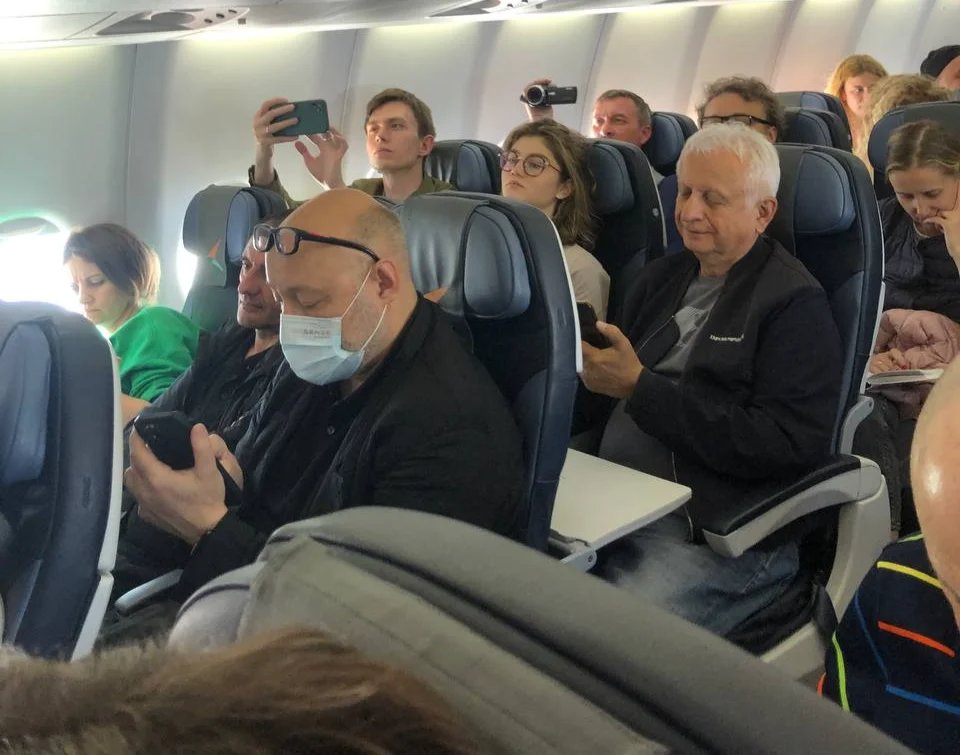
Passengers of the Moscow-Tbilisi flight onboard the plane. Photo: Fyodor Yershov, exclusively for Novaya Gazeta Europe
Russian airship
A feeling of stress appears as the plane is taxiing. Tazu receives a message on WhatsApp: some acquaintance of his informs him the airport was been cordoned off by the police. The message also has a laughing emoji signed: Welcome to Georgia!
There are police cordons inside the building. Dozens of Georgian TV cameras: “Why did you bother coming here? Are you aware that 20% of Georgia is occupied by Russia? What are you doing here?”
As I finally go outside, I can hear deafening hissing, a voice that repeats “Russian airship go fuck yourself”, and see a poster reading “You Are Not Welcome”. It turns out Merab Chikashvili was a bit dishonest. The local population is far from being unanimous on the pro-Russian policy of its government. The protesters sing anthems of Georgia, Ukraine, and the European Union. Paper Kartuli says the police detained six people at the airport, including four prominent opposition politicians.
One of the protesters is Misha Mshviladze, a film director and screenwriter. “Putin’s decision will allow FSB agents to enter the country using direct flights,” he says. “We don’t need them. We generally do not welcome regular Russians who come to Georgia as tourists. Russia still occupies 20% of our territory in Abkhazia and South Ossetia. We only support real opposition who immigrated here. We hope that the defeat in the Ukraine war will allow Russia to change.” The screenwriter also says Kobakhidze’s claims about 1 million Georgians living in Russia are nothing but lies. In reality, the real figure stands at around 110 thousand. “Yes, that is a lot of people, but I’m sure that most of the passengers coming from Moscow will be Russians. Stats will soon prove this. But the most important thing is that it’s not Georgia or Russia who restore direct flights; it’s a personal decision of Putin, and he only thinks about himself rather than any domestic or foreign nationals.”
Elene Khoshtaria, the leader of the opposition party Droa, is also present at the protest. She agrees with Mshviladze: “Russia is a terrorist state, an occupier that bombs civilians. Georgians do not support Russia, they support Ukraine and the EU, unlike the current pro-Russian government. This is why our duty is to stand against it, be active, and protest.”
The anonymous protester holding a “Russia Is a Terrorist State” poster is even more laconic: “We support Ukraine. We are against Putin and his planes.”
Join us in rebuilding Novaya Gazeta Europe
The Russian government has banned independent media. We were forced to leave our country in order to keep doing our job, telling our readers about what is going on Russia, Ukraine and Europe.
We will continue fighting against warfare and dictatorship. We believe that freedom of speech is the most efficient antidote against tyranny. Support us financially to help us fight for peace and freedom.
By clicking the Support button, you agree to the processing of your personal data.
To cancel a regular donation, please write to [email protected]
